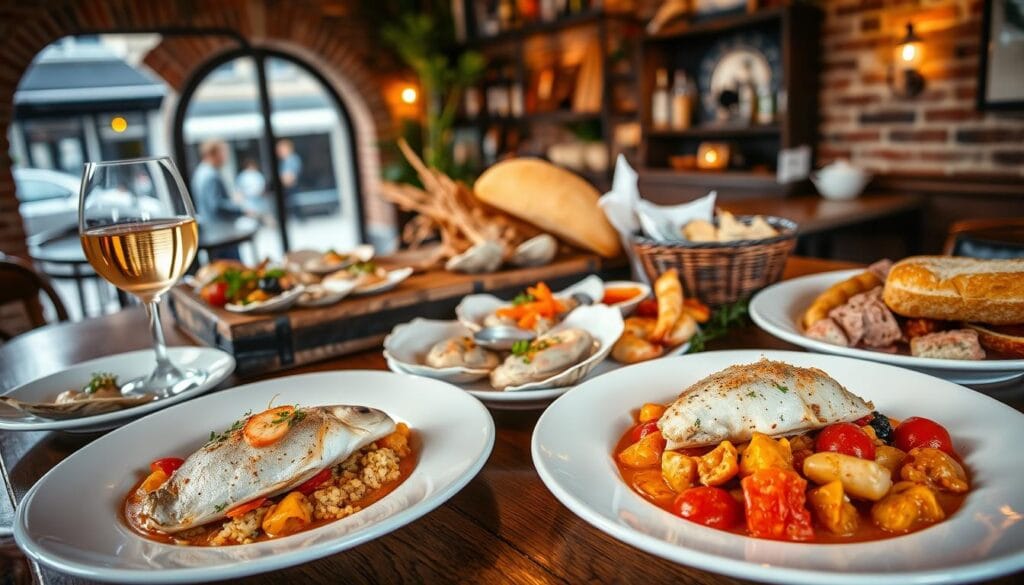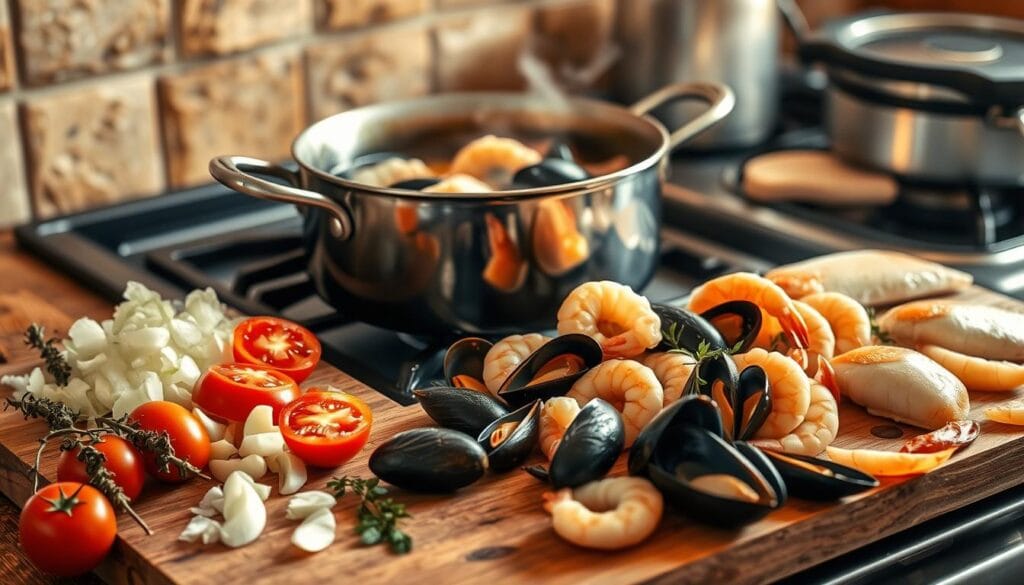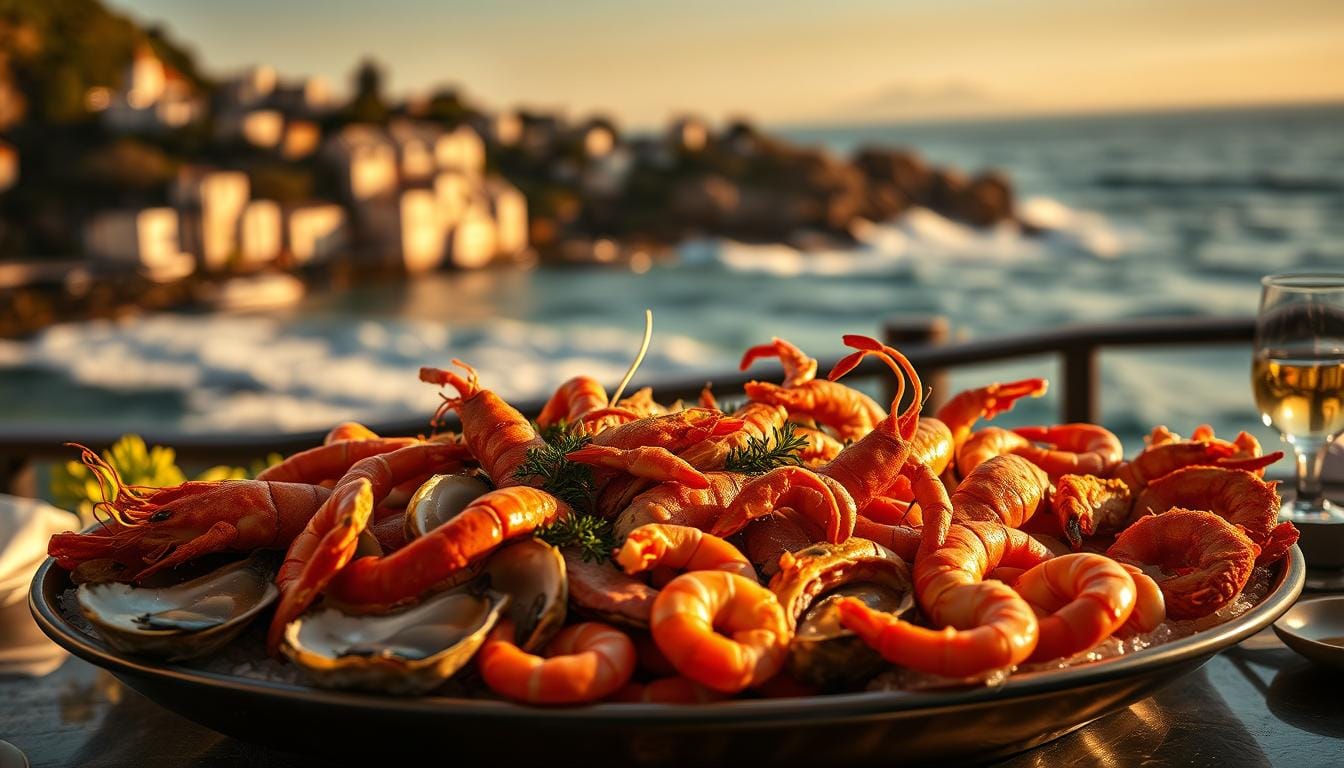The French coastline whispers secrets of cooking to those who listen. Growing up, I saw my grandmother turn simple seafood into amazing dishes. These dishes were full of coastal magic and told stories of tradition and respect for the sea.
French seafood cooking is more than just making food; it’s an art. It’s rooted in local traditions. From Brittany’s rocky shores to the Mediterranean, each dish shows the country’s rich sea heritage. It turns fresh seafood into culinary wonders.
Exploring French seafood cooking, you’ll learn about detailed techniques and vibrant flavors. You’ll see how passion for ingredients makes simple seafood into something special. Each recipe brings the spirit of coastal France to your table, inviting you to celebrate through cooking.
Table of Contents
Understanding French Coastal Cuisine Heritage
French coastal cuisine is a colorful mix of cooking traditions. These traditions come from the sea. The Mediterranean and Atlantic coasts have made seafood dishes special, like the famous French seafood stew.
The Influence of Regional Waters
Every French coastal area has its own flavor in seafood cooking. For example, the waters around Marseille helped create bouillabaisse. This fish stew is a key dish from Provençal cuisine, showing the local sea’s influence.
- Mediterranean coastal regions specialize in lighter, herb-infused seafood dishes
- Atlantic coastal areas feature richer, more robust seafood preparations
- Normandy and Brittany contribute unique shellfish cooking techniques
Traditional Fishing Communities
For many years, fishermen have kept seafood cooking alive. They turn fresh fish into amazing dishes. This knowledge is shared through family and local cooking ways.
“The sea provides, and we honor its gifts through our cooking.” – Traditional Marseille Fisherman
Historical Evolution of Seafood Preparation
Seafood stew in France has changed a lot. It went from simple meals to fancy dishes. Bouillabaisse is a great example, moving from a simple fisherman’s meal to a world-famous dish.
| Era | Seafood Preparation Characteristics |
|---|---|
| 19th Century | Basic preservation and simple cooking methods |
| Early 20th Century | Introduction of regional spices and techniques |
| Modern Day | Gourmet interpretation with sustainable practices |
The rich history of French coastal cuisine still inspires many. It celebrates the sea’s gifts through both new and old cooking ways.
Essential French Seafood Recipes

France’s long coastline turns seafood into amazing dishes. With 3,427 kilometers of coast, France has many classic fish dishes. These dishes show the country’s love for the sea.
Let’s look at some famous seafood recipes that show off French cooking:
- Moules Marinières: A classic dish that is simple yet full of flavor
- Sole Meunière: A dish that shows French skill in cooking seafood
- Bouillabaisse: A rich seafood stew from Marseille
“In French cuisine, seafood is not just food, it’s an art form.” – Anonymous French Chef
Moules marinières is a top seafood dish in France. It makes fresh mussels into a great meal with white wine, shallots, and herbs. About 70% of mussels in France come from local farms, making them very good.
When making these dishes, keep in mind that 60% of French fish recipes use butter or cream. This adds rich, tasty flavors to simple ingredients.
Regional Seafood Specialties
Every coastal area in France has its own seafood dishes. From Brittany’s rockfish soups to Provence’s dishes inspired by the Mediterranean, there’s a lot of variety.
Exploring French seafood is a journey of taste, tradition, and top-notch food.
Mastering French Seafood Soups and Stews

French coastal cuisine celebrates the ocean’s bounty through remarkable seafood stews. These dishes capture the essence of maritime traditions. They transform simple ingredients into extraordinary dishes that tell stories of regional flavors and fishing heritage.
Exploring French seafood soups reveals a rich tapestry of culinary techniques passed down through generations. The bouillabaisse recipe stands as a pinnacle of Provençal cooking. It represents the pinnacle of seafood preparation.
Seafood Bisque Techniques
Creating an authentic seafood bisque requires precision and respect for ingredients. The key elements include:
- Using fresh, high-quality seafood
- Building a rich, creamy base
- Incorporating delicate herbs and spices
Bouillabaisse Preparation Guide
A traditional bouillabaisse recipe demands careful attention to detail. Julia Child’s classic approach involves:
- Using 6 different kinds of fish and shellfish
- Preparing approximately 3 pounds of fish
- Simmering for 40 minutes
- Adding 2 teaspoons of saffron threads for deep flavor
“A great seafood stew is not just a dish, it’s a celebration of the ocean’s gifts.” – French Culinary Tradition
Regional Soup Variations
Different coastal regions in France develop unique approaches to seafood stews. Soupe de Poisson showcases this diversity by utilizing discarded fish parts to create incredibly flavorful broths.
| Region | Unique Characteristic |
|---|---|
| Provence | Tomato-based bouillabaisse |
| Brittany | Shellfish-rich seafood soups |
Whether you’re a home cook or a culinary enthusiast, mastering these French seafood stew techniques will transport your kitchen to the beautiful coastal regions of France.
Classic French Fish Preparations
Explore the world of classic French fish dishes. Here, simplicity meets elegance. French seafood cooking turns simple ingredients into amazing meals that excite the senses.
Sole meunière is a prime example of French seafood mastery. This dish shows the delicate art of cooking fish with care. To make sole meunière, follow these steps:
- Select fresh, high-quality fish fillets
- Carefully dredge in seasoned flour
- Cook in brown butter until golden
- Finish with fresh parsley and lemon
Colin à la Bordelaise is another classic French fish dish. It comes from the Bordeaux region. This dish shows the variety of French seafood cooking.
| Dish | Preparation Time | Calories per Serving |
|---|---|---|
| Sole Meunière | 20 minutes | 351 kcal |
| Colin à la Bordelaise | 25 minutes | 325 kcal |
“In French cooking, fish is not just food, it’s an art form.” – Julia Child
Success in making classic French fish dishes comes down to three things: fresh ingredients, proper technique, and respect for the fish’s natural flavor. Master these, and you’ll make seafood like a pro in your kitchen.
French Shellfish Delicacies and Techniques
French coastal cuisine celebrates the rich bounty of shellfish with exquisite preparations. These dishes showcase the delicate flavors of the sea. Moules marinières and coquilles st jacques are the pinnacle of seafood mastery.
Exploring French shellfish delicacies opens a world of culinary artistry. It transforms simple ingredients into extraordinary meals. The techniques passed down through generations reveal the true magic of shellfish preparation.
Mussel and Clam Preparations
Moules marinières is a quintessential French shellfish dish. It captures the essence of coastal cooking. To prepare this classic recipe, you’ll need:
- Fresh mussels cleaned and debearded
- Shallots and garlic
- White wine
- Fresh parsley
- Butter
Luxurious Shellfish Dishes
Coquilles st jacques is the pinnacle of French seafood elegance. It combines delicate scallops with a rich, creamy sauce. This showcases the seafood’s natural sweetness.
“The secret to perfect shellfish is respecting the ingredient’s delicate flavor and cooking it with precision.” – French Culinary Master
Traditional Shellfish Sauces
French chefs elevate shellfish dishes with extraordinary sauces. These sauces complement the seafood’s natural flavors. Some remarkable sauce techniques include:
- Beurre blanc
- Rouille
- Champagne cream sauce
The art of preparing shellfish requires patience, skill, and a deep understanding of flavor combinations. With practice, you can bring the magic of French coastal cuisine to your own kitchen.
Essential Sauces and Accompaniments
French cuisine makes seafood special with its sauces and sides. Learning how to make these sauces is key to a true French meal.
The history of French seafood sauces goes back to the 19th century. Chefs like Marie-Antoine Carême created the “mother sauces”. Later, Auguste Escoffier improved these methods, making seafood dishes even better.
Classic French Seafood Sauces
- Rouille: A spicy sauce for bouillabaisse
- Aioli: Garlic mayonnaise for seafood
- Beurre Blanc: A light white butter sauce
Choosing the right sauce can change your brandade de morue. Herbs like thyme, lavender, and fennel from Herbes de Provence add a lot to seafood flavors.
“In French cuisine, a sauce is not merely a condiment, but the soul of the dish.” – Traditional French Culinary Wisdom
| Sauce | Primary Ingredients | Best Paired Seafood |
|---|---|---|
| Rouille | Roasted peppers, garlic, olive oil | Bouillabaisse, shellfish |
| Aioli | Garlic, egg yolks, olive oil | Cod, shrimp, mussels |
| Beurre Blanc | Butter, white wine, shallots | Delicate white fish |
When making French seafood dishes, think about wine pairings. A crisp white wine like Sauvignon Blanc or Chablis can really bring out the flavors of your meal.
Conclusion
French seafood recipes are more than just dishes. They show a deep love for fresh ingredients, precise cooking, and the variety of regions. Your exploration of classic French fish dishes has shown us the beauty of coastal cooking.
These recipes teach us how French chefs make simple seafood into amazing dishes. From Marseille’s bouillabaisse to Coquilles Saint-Jacques, each dish shares a story of tradition and skill. The focus on quality ingredients and careful preparation makes French seafood cooking special.
Learning these French seafood recipes can make your cooking better. Whether you cook at home or dream of being a chef, you’ll gain valuable skills. Remember, the key to great cooking is using the best ingredients, following traditional methods, and letting your love for food show in every dish.
Keep exploring the world of French cooking. Try new things, use the freshest ingredients, and always be curious. The world of French seafood cuisine is full of wonders, waiting for you to discover.
FAQ
What are some classic French seafood dishes I should try?
You should try Bouillabaisse, a Provençal fish stew. Also, Moules Marinières, steamed mussels, are a must. Don’t miss Sole Meunière, fish cooked in brown butter, and Coquilles St. Jacques, a scallop dish. These dishes highlight French coastal cuisine’s rich seafood tradition.
How important is fresh seafood in French cooking?
Fresh seafood is key in French cooking. Chefs focus on using local, seasonal seafood. The quality of the ingredients greatly affects the dish’s flavor and authenticity.
What makes Bouillabaisse so special in French cuisine?
Bouillabaisse is more than a stew. It’s a tradition from Marseille. It combines local fish, shellfish, and a flavorful broth. It’s often served with rouille and crusty bread.
What are the key techniques in preparing French seafood?
French seafood prep uses simple, elegant techniques. These highlight the seafood’s natural flavors. Techniques include meunière, steaming mussels, and making delicate sauces.
How do different French coastal regions influence seafood recipes?
Each coastal region has its seafood traditions. Brittany is famous for oysters and shellfish. Provence is known for bouillabaisse. Normandy has rich seafood stews, and the Mediterranean coast offers lighter dishes. Local ingredients and fishing traditions shape the recipes.
What are some essential French seafood sauces?
Essential sauces include beurre blanc and rouille. Also, aioli and classic butter sauces are key. These enhance the seafood’s natural flavors.
Can I make authentic French seafood dishes at home?
Yes, you can! Many French seafood recipes are simple. Use fresh ingredients, master basic techniques, and focus on flavor balance. Start with dishes like Moules Marinières or Sole Meunière.
What wines pair well with French seafood dishes?
Crisp white wines pair best with seafood. Try French whites like Chablis or Sancerre. For richer dishes, a light Provence rosé or Chardonnay is great.

